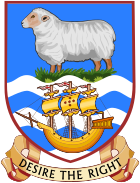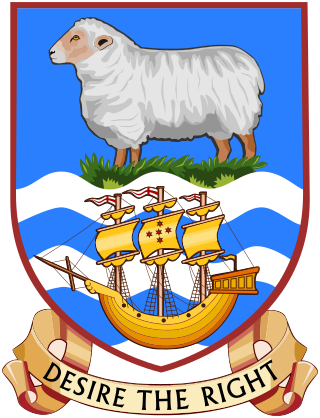
The Legislative Assembly of the Falkland Islands is the unicameral legislature of the British Overseas Territory of the Falkland Islands. The Legislative Assembly replaced the Legislative Council when the new Constitution of the Falklands came into force in 2009 and laid out the composition, powers and procedures of the islands' legislature.
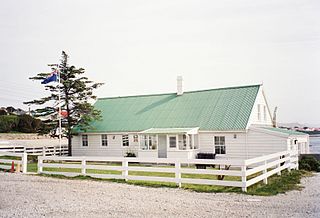
The Legislative Council of the Falkland Islands was the unicameral legislature of the Falkland Islands from 13 November 1845 until 1 January 2009. The new constitution came into force in 2009 and replaced the Legislative Council with the Legislative Assembly of the Falkland Islands.

The Executive Council of the Falkland Islands is the policy making body of the Government of the Falkland Islands, exercising executive power by advising the Governor. It has an equivalent role to that of the Privy Council in the United Kingdom. The first Executive Council for the Falklands was inaugurated on 2 April 1845 by Governor Richard Moody.

The Falkland Islands Constitution is a predominantly codified constitution documented primarily within the Falkland Islands Constitution Order 2008, a statutory instrument of the United Kingdom. The constitution, in its present form, was made on 5 November 2008 by Queen Elizabeth II in a meeting of the Privy Council at Buckingham Palace. It was laid before Parliament on 12 November 2008 and came into force on 1 January 2009, replacing the 1985 constitution.

The Falkland Islands general election of 2009 was held on Thursday 5 November 2009 to elect members to the Legislative Assembly. It was the first general election in the Falkland Islands since the new constitution came into force on 1 January 2009, which replaced the old Legislative Council with the Legislative Assembly. Chief Executive Tim Thorogood acted as Returning Officer.

The Falkland Islands general election of 2005 was held on Thursday 17 November 2005 to elect members to the Legislative Council. It would be the last general election in the Falkland Islands before the new constitution came into force, which replaced the Legislative Council with the Legislative Assembly. Chief Executive Chris Simpkins acted as Returning Officer.

The Falkland Islands general election of 2013 was held on Thursday 7 November 2013 to elect all eight members of the Legislative Assembly through universal suffrage using block voting, with each Stanley constituent having up to 5 votes and each Camp constituent having up to 3 votes. A total of 1,046 ballots were cast in Stanley, representing a turn-out of 75.4%, and 242 ballots in Camp, representing a turn-out of 85.5%. As no political parties are active in the Falklands, all the candidates stood as Independents. The Chief Executive of the Falkland Islands, Keith Padgett, acted as returning officer. It was the second election since the new Constitution came into force replacing the Legislative Council with the Legislative Assembly.
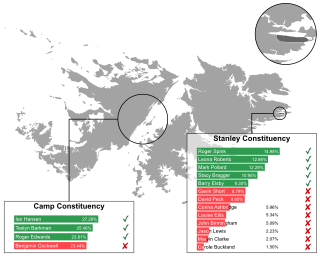
The Falkland Islands general election of 2017 was held on Thursday 9 November 2017 to elect all eight members of the Legislative Assembly through universal suffrage using block voting, with each Stanley constituent having up to 5 votes and each Camp constituent having up to 3 votes. Voter turnout was 80% in Stanley and 86% in Camp.

Stanley is a constituency of the Legislative Assembly of the Falkland Islands which has been in existence since the first elections in the Falklands in 1949. The constituency of Stanley consists of the area that lies within 5.6 kilometres (3.5 mi) of the spire of Christ Church Cathedral. This covers the city of Stanley, which is the largest settlement in the Falklands representing almost 75% of the total population of the islands. Stanley is one of two constituencies in the Falklands, the other being Camp.

Camp is a constituency of the Legislative Assembly of the Falkland Islands which has been in existence since 1977. The constituency of Camp consists of all parts of the territory which lie more than 3.5 miles from the spire of Christ Church Cathedral, Stanley. It takes its name from the term "Camp", which refers to the territory outside the city of Stanley and RAF Mount Pleasant. Camp is one of two constituencies in the Falklands, the other being Stanley.
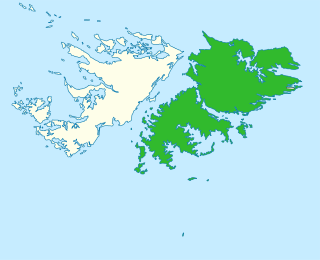
East Falkland was a constituency of the Legislative Council of the Falkland Islands which was in existence from the first elections in the Falklands in 1949 until the 1985 election when the Falkland Islands Constitution came into force, abolishing the constituency. The constituency of East Falkland elected one member to the Legislative Council and consisted of the whole area of the island of East Falkland, excluding Stanley, and some neighbouring islands. In 1964 it became the first seat to elect a female Councillor, Marjorie Vinson. East Falkland is now part of the Camp constituency.

West Stanley was a constituency of the Legislative Council of the Falkland Islands which existed from 1977 until 1985. The constituency was created in 1977 with the implementation of the Falkland Islands Order 1977 and was abolished just eight years later when the Falkland Islands Constitution came into force in 1985. The constituency of West Stanley elected one member to the Legislative Council and consisted of the westerly area of the capital city. West Stanley is now part of the Stanley constituency.

The Falkland Islands general election of 1971 was held on 30 November – 2 December 1971 to elect members to the Legislative Council. Four out of the ten Councillors were elected through universal suffrage, two from Stanley and one each from East Falkland and West Falkland.

The Falkland Islands general election of 1976 was held in 1976 to elect members to the Legislative Council. Four out of the ten Councillors were elected through universal suffrage, two from Stanley and one each from East Falkland and West Falkland. The election was delayed twice, first in November 1975 when the dissolution of the Legislative Council was postponed by ten weeks to 31 January 1976 and then again in January 1976 when it was postponed to 28 February 1976. This was done in the hope that the election would be held under the proposed new constitution and to allow the Falkland Islanders opportunity to study the report of the Select Committee before the election took place. In reality, the new constitution did not come into force until the following year, with the first election under the new constitution taking place in October 1977, just 15 months after the last election.

The Falkland Islands general election of 1981 was held on Thursday 1 October 1981 to elect members to the Legislative Council. Six Councillors were elected through universal suffrage, one from each constituency.

The Falkland Islands general election of 1985 was held on Thursday 3 October 1985 to elect members to the Legislative Council. Eight Councillors were elected through universal suffrage using block voting, four from each constituency.

The Falkland Islands general election of 1997 was held on Thursday 9 October 1997 to elect members to the Legislative Council. Eight Councillors were elected through universal suffrage using block voting, five from the Stanley constituency and three from the Camp constituency.

The Falkland Islands general election of 2021 was held on Thursday 4 November 2021 to elect all eight members of the Legislative Assembly through universal suffrage using block voting, with the Chief Executive of the Falkland Islands acting as returning officer. It was the fourth election since the new Constitution came into force replacing the Legislative Council with the Legislative Assembly.

A referendum on reforming the electoral system was held in the Falkland Islands on 24 September 2020, after being postponed from 26 March 2020 following the Coronavirus pandemic. Voters were asked if they wanted to replace the two existing electoral constituencies with a single constituency for the whole of the Islands. Although a majority of those who voted supported the change, the required two-thirds majority in both of the islands' constituencies was not achieved.
